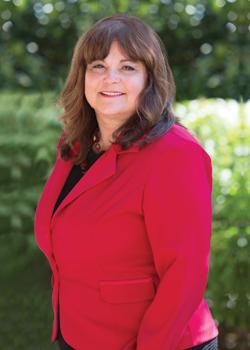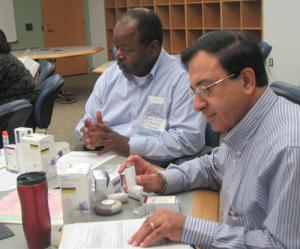George Barrett, Chairman and CEO of Cardinal Health, Visits SOP
Industry leader delivers lecture about the state of health care and today’s job market, addressing questions from students as they consider the next steps in their careers.
By Malissa Carroll
October 17, 2012
When George Barrett was beginning his career, the major players in the health care industry were very distinct. “A hospital was a hospital and a retail pharmacy was a retail pharmacy,” he told students and faculty at the University of Maryland School of Pharmacy.
Since that time, however, much has changed.
“What used to be an industry filled with different specialized players is changing and beginning to coordinate in different ways,” added Barrett. “It’s an important trend that has required companies like ours [Cardinal Health] to get a bigger position outside the hospital, where we had our historical strength.”
As the business behind health care, Cardinal Health helps pharmacies, hospitals, and ambulatory care sites focus on patient care while reducing costs, improving efficiency and quality, and increasing profitability. The company employs more than 30,000 people worldwide and has been ranked number 21 in the Fortune 500. Its pharmaceutical segment represents more than 80 percent of the company’s earnings today.
“For us as a business, pharmacy is really important,” said Barrett. “Not only are pharmacists our customers, but we also hire thousands of pharmacists. We hire them for technical roles and advisor roles, and we even have pharmacists working in our marketing department. Our employees are so knowledgeable about everything that happens in the health system, which is part of our sustaining value. That’s why we need folks like you as a part of our organization.”
In addition to his current role as chairman and chief executive officer at Cardinal Health, Barrett has held leadership positions at Teva Pharmaceuticals, Alpharma, and NMC Laboratories. He received a Bachelor’s of Arts degree from Brown University and a Master’s in Business Administration from New York University. He also holds an honorary doctorate of human letters from Long Island University’s Arnold & Marie Schwartz College of Pharmacy and Health Sciences.
Delivering his lecture at the School of Pharmacy, Barrett noted that the current health care system is outdated and in need of tremendous change if it is to continue meeting the needs of an aging population. He recommended a rethinking of the way in which care is not only provided, but also paid for.
“We have a system that focuses on treating acute illness – generally in the hospital,” said Barrett. “We have to think about an entirely different universe in which we try to keep people healthy. Ideally, we need to keep them out of the hospital and treat them in the most cost-effective setting possible, which is part of the reason why I think pharmacists are going to have a bigger role in health care going forward.”
Though he acknowledges that the current system needs to change, he also admits that he is unsure of what form this change might take and how it will be received by members of the health care industry, sharing advice that he often offers to his own employees.
“We’re going to have to compete in the world that we know, and compete to win every day,” said Barrett. “However, at the same time, we have to try to imagine a world that looks different and is driven by inescapable forces. We don’t know exactly what it’s going to look like. We don’t know what the business model will be. We just know that it’s going to change.”
He also notes that this change could hold a number of benefits for future pharmacists, arguing, “The pharmacist is one of our first responders in the system. We are going to have a shortage of primary care physicians. That’s not a question. Who is going to help patients navigate this new system? I believe that pharmacists are going to play a big role.”
Following his lecture, Barrett fielded questions from students that addressed a wide range of health care related topics, including the consolidation of health care organizations and the obstacles that stand in the way to developing a truly centralized health care system. He also offered valuable leadership advice to students who might be thinking about opening their own pharmacies or applying to corporate positions following graduation.
“You’re at a great time in life where you’re learning about all these new tools and disciplines,” Barrett said. “Constant learning is key – that will not change. If it does, you will stall in your career and you will also likely stall in terms of having a rewarding life and a rewarding experience. Every great leader that I’ve ever seen is a great learner.”



